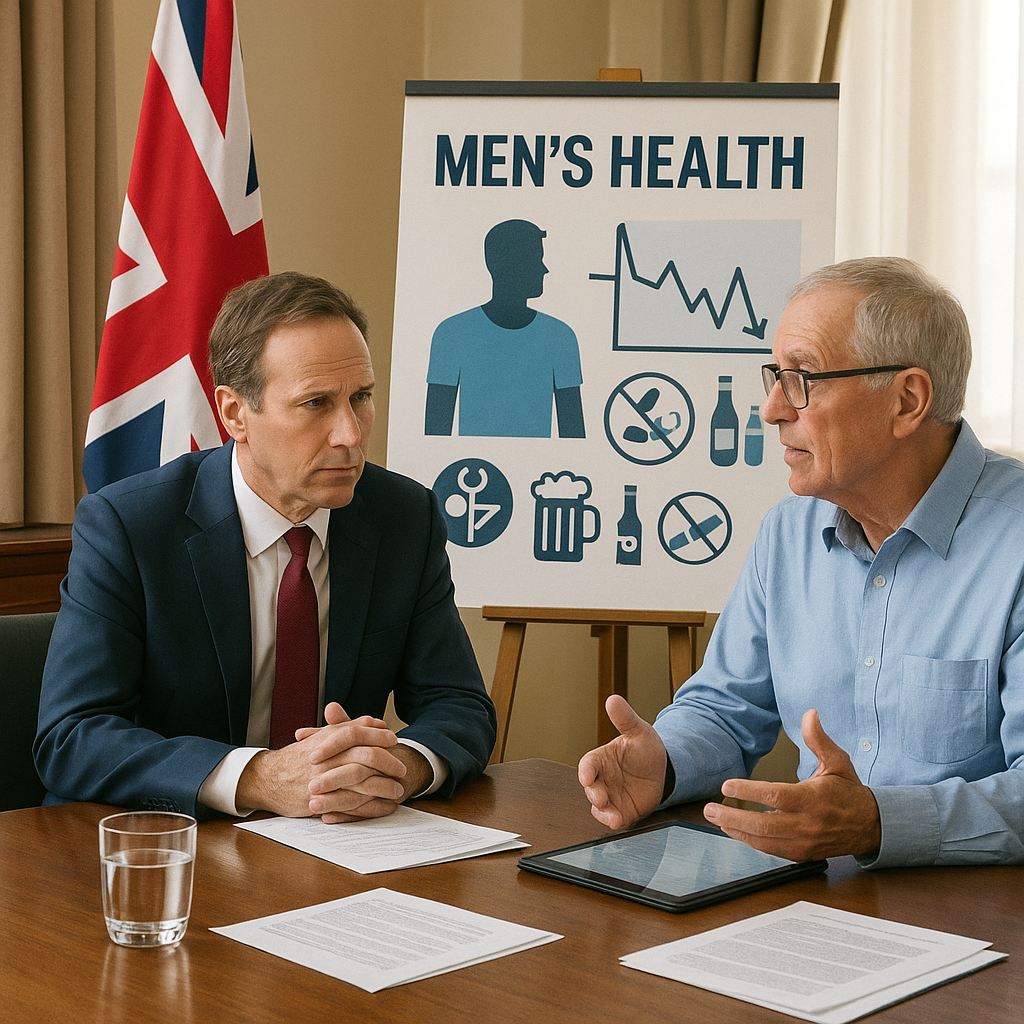In April 2025, the government in England plans to initiate a consultation for a new men’s health strategy, a move that many experts believe is long overdue. Research indicates that men are significantly more likely than women to experience premature death, raising questions about the underlying reasons for their poor health. Factors such as lifestyle choices, societal expectations, and access to healthcare services contribute to this troubling trend. Understanding these issues is crucial for developing effective interventions to improve men’s health.
One of the primary reasons for men’s poor health is their tendency to engage in riskier behaviors. Men are more likely to smoke, consume excessive alcohol, use drugs, and suffer from high cholesterol and blood pressure. These factors contribute to a life expectancy that is, on average, four years shorter than that of women. Furthermore, men are nearly 60% more likely to die prematurely from conditions such as heart disease, lung cancer, and liver disease. Experts like Prof. Alan White argue that while lifestyle choices play a role, the issue is more complex and includes biological factors that affect men’s health.
Additionally, societal norms often discourage men from seeking help for health issues. The expectation for men to be strong and resilient can lead to a reluctance to engage with healthcare services. Prof. White points out that men often lack the necessary health literacy to recognize and act upon health concerns. Unlike women, who typically have regular interactions with healthcare providers due to reproductive health needs, many men go years without seeking medical advice. This lack of engagement can exacerbate health problems and lead to worse outcomes.
Economic factors also play a significant role in men’s health. Men working in blue-collar jobs often face challenges in accessing healthcare due to time constraints and job-related pressures. Mark Brooks, a policy adviser, highlights that men in deprived areas have a significantly lower life expectancy compared to those in wealthier regions. Many men may ignore early warning signs of health issues due to fears about job security or financial stability, further complicating their health situation.
Despite these challenges, there are initiatives aimed at improving men’s health. Programs that encourage men to engage in physical activities and social interactions have shown promise. For example, the Men’s Sheds movement fosters community support through practical projects, helping men bond while addressing their health needs. Experts like Prof. Paul Galdas emphasize the importance of creating engaging and action-oriented programs to motivate men to take charge of their health. As the government prepares to unveil its men’s health strategy, there is hope that it will raise awareness and encourage men to prioritize their well-being.
Original news source: Why men are so unhealthy – and what can be done (BBC)
🎧 Listen:
Slow
Normal
Fast
📖 Vocabulary:
| 1 | initiate | To begin or start something |
| 2 | premature | Occurring before the expected time |
| 3 | underlying | Basic or fundamental, often hidden |
| 4 | interventions | Actions taken to improve a situation |
| 5 | expectancy | The anticipated duration of life |
| 6 | resilient | Able to withstand or recover quickly from difficult conditions |
| 7 | literacy | The ability to read, write, and understand information |
| 8 | deprived | Lacking basic necessities or resources |
| 9 | initiatives | Plans or actions intended to address a problem |
| 10 | foster | To encourage or promote the development of something |
| 11 | unveil | To reveal or make known |
| 12 | strategy | A plan or method for achieving a specific goal |
| 13 | awareness | Knowledge or perception of a situation or fact |
| 14 | prioritize | To give priority or importance to something |
| 15 | well-being | The state of being comfortable, healthy, or happy |
Group or Classroom Activities
Warm-up Activities:
– CHARADES
Instructions: Students will take turns acting out different health-related terms or phrases from the article (e.g., “smoking,” “heart disease,” “Men’s Sheds”). The rest of the class will guess the term being acted out. This will help reinforce vocabulary in a fun and engaging way.
– OPINION SPECTRUM
Instructions: Create a line in the classroom with “Strongly Agree” on one end and “Strongly Disagree” on the other. Present statements related to men’s health (e.g., “Men should prioritize their health” or “Society puts too much pressure on men to be strong”). Students will position themselves along the line based on their opinions and then discuss their reasoning in small groups.
– MIND MAP
Instructions: In small groups, students will create a mind map on a large sheet of paper that organizes the main factors affecting men’s health mentioned in the article. They should include lifestyle choices, societal expectations, and economic factors, and then brainstorm additional ideas that connect to these themes.
– FUTURE PREDICTIONS
Instructions: Students will work in pairs to brainstorm and write down their predictions for how men’s health might change over the next 10 years, especially considering the government’s new health strategy. They should consider factors like societal changes, advancements in healthcare, and shifts in public awareness.
– SYNONYM CHALLENGE
Instructions: Provide students with a list of key vocabulary from the article (e.g., “premature,” “interventions,” “health literacy”). In pairs, they will try to come up with as many synonyms as possible for each word within a set time limit. Afterward, they will share their synonyms with the class to expand their vocabulary further.
🤔 Comprehension Questions:
1. What is the primary goal of the consultation that the government in England plans to initiate in April 2025?
2. How do lifestyle choices contribute to men’s health issues according to the article?
3. What are some specific health conditions mentioned that men are more likely to die from prematurely?
4. In what ways do societal norms impact men’s willingness to seek help for health issues?
5. How does the lack of health literacy among men affect their health outcomes?
6. What challenges do men in blue-collar jobs face in accessing healthcare services?
7. What initiatives are mentioned in the article that aim to improve men’s health?
8. How does the Men’s Sheds movement contribute to addressing men’s health needs?
Go to answers ⇩
🎧✍️ Listen and Fill in the Gaps:
In April 2025, the government in England plans to initiate a (1)______ for a new men’s (2)______ strategy, a move that many experts (3)______ is long overdue. Research (4)______ that men are significantly more likely than women to experience premature death, raising questions about the underlying reasons for their poor health. Factors such as lifestyle choices, societal expectations, and access to healthcare services contribute to this troubling trend. Understanding these issues is crucial for developing effective interventions to improve men’s health.
One of the primary reasons for men’s poor health is their tendency to engage in riskier behaviors. Men are more likely to smoke, consume excessive alcohol, use drugs, and suffer from high cholesterol and blood pressure. These factors contribute to a life expectancy that is, on average, four years shorter than that of women. Furthermore, men are nearly 60% more likely to die prematurely from conditions such as heart disease, lung cancer, and liver disease. Experts like Prof. Alan White argue that while lifestyle choices play a role, the issue is more (5)______ and includes biological factors that affect men’s health.
Additionally, societal norms often discourage men from (6)______ help for health (7)______. The expectation for men to be (8)______ and resilient can lead to a reluctance to engage with healthcare services. Prof. White points out that men often lack the necessary health literacy to recognize and act upon health concerns. Unlike women, who typically have regular interactions with healthcare providers due to reproductive health needs, many men go years without seeking medical advice. This lack of engagement can exacerbate health (9)______ and lead to (10)______ outcomes.
Economic factors also play a significant role in men’s health. Men working in blue-collar jobs often face challenges in accessing healthcare due to time constraints and job-related pressures. Mark Brooks, a policy (11)______, highlights that men in deprived areas have a significantly lower life expectancy compared to those in (12)______ regions. Many men may ignore early warning signs of health issues due to fears about job security or financial stability, further complicating their health situation.
Despite these challenges, there are initiatives aimed at (13)______ men’s health. Programs that encourage men to (14)______ in physical activities and social (15)______ have shown promise. For example, the Men’s Sheds movement fosters community support through practical projects, helping men bond while addressing their health needs. Experts like Prof. Paul Galdas emphasize the importance of creating engaging and action-oriented programs to motivate men to take charge of their health. As the government prepares to unveil its men’s health strategy, there is hope that it will raise (16)______ and encourage men to prioritize their well-being.
Go to answers ⇩
💬 Discussion Questions:
Students can ask a partner these questions, or discuss them as a group.
1. What is your opinion on the idea that men are less likely to seek help for health issues? Why do you think this is the case?
2. How would you feel if you had to convince a friend to seek medical help for a health issue?
3. Do you think societal expectations of masculinity contribute to men’s health problems? Why or why not?
4. What is a health behavior that you think is particularly risky for men? Why do you feel this way?
5. How do you think economic factors influence men’s health in your country?
6. Do you like the idea of community support programs like Men’s Sheds? Why or why not?
7. What is a way you think healthcare services could be made more accessible for men in blue-collar jobs?
8. How would you feel if you were in a situation where you had to choose between job security and your health?
9. Do you think that raising awareness about men’s health issues is enough to make a difference? Why or why not?
10. What is a lifestyle choice you believe is essential for improving men’s health? Why do you think it’s important?
11. How would you feel if you were part of a movement aimed at improving men’s health?
12. Do you think men should prioritize their health as much as women do? Why or why not?
13. What is a personal experience you have had that relates to health and societal expectations?
14. How do you think health literacy can be improved among men? What strategies could be effective?
15. Do you think the government should play a more active role in addressing men’s health issues? Why or why not?
Individual Activities
📖💭 Vocabulary Meanings:
Match each word to its meaning.
Words:
1. initiate
2. premature
3. underlying
4. interventions
5. expectancy
6. resilient
7. literacy
8. deprived
9. initiatives
10. foster
11. unveil
12. strategy
13. awareness
14. prioritize
15. well-being
Meanings:
(A) Knowledge or perception of a situation or fact
(B) Lacking basic necessities or resources
(C) The ability to read, write, and understand information
(D) Able to withstand or recover quickly from difficult conditions
(E) The state of being comfortable, healthy, or happy
(F) Occurring before the expected time
(G) Plans or actions intended to address a problem
(H) To give priority or importance to something
(I) A plan or method for achieving a specific goal
(J) Basic or fundamental, often hidden
(K) The anticipated duration of life
(L) To begin or start something
(M) Actions taken to improve a situation
(N) To encourage or promote the development of something
(O) To reveal or make known
Go to answers ⇩
🔡 Multiple Choice Questions:
1. What is the primary focus of the consultation planned by the government in England for April 2025?
(a) Women’s health initiatives
(b) A new men’s health strategy
(c) Children’s health programs
(d) Mental health awareness
2. According to the article, what is one of the main reasons for men’s poor health?
(a) Lack of exercise
(b) Riskier behaviors
(c) Poor diet
(d) Genetic predisposition
3. How much shorter is the average life expectancy of men compared to women?
(a) Two years
(b) Five years
(c) Four years
(d) Three years
4. What societal expectation often discourages men from seeking help for health issues?
(a) The expectation to be strong and resilient
(b) The need to be financially successful
(c) The desire to avoid vulnerability
(d) The pressure to maintain a busy lifestyle
5. What is a significant economic factor affecting men’s health, as mentioned in the article?
(a) Access to healthcare services
(b) Availability of healthy food options
(c) Educational opportunities
(d) Social status
6. Which initiative is mentioned in the article as a way to improve men’s health through community support?
(a) The Men’s Health Network
(b) The Health for Men initiative
(c) The Community Health Program
(d) The Men’s Sheds movement
7. What do experts suggest is crucial for developing effective interventions to improve men’s health?
(a) Increasing healthcare funding
(b) Promoting mental health awareness
(c) Understanding underlying issues
(d) Enhancing medical technology
8. What is the hope associated with the government’s upcoming men’s health strategy?
(a) To reduce healthcare costs for men
(b) To provide free health screenings for all men
(c) To increase the number of male healthcare providers
(d) To raise awareness and encourage men to prioritize their well-being
Go to answers ⇩
🕵️ True or False Questions:
1. Research shows that women are more likely than men to experience premature death.
2. On average, men have a life expectancy that is four years longer than that of women.
3. Initiatives like the Women’s Caves movement aim to worsen men’s health by fostering community support.
4. Societal norms often discourage men from seeking help for health issues.
5. The government in England plans to cancel initiation of a consultation for a new men’s health strategy in April 2025.
6. Men are more likely to engage in risky behaviors such as smoking and excessive alcohol consumption.
7. Lifestyle choices, societal expectations, and access to healthcare services contribute to men’s poor health.
8. Men working in blue-collar jobs face challenges in accessing healthcare due to time constraints.
Go to answers ⇩
📝 Write a Summary:
Write a summary of this news article in two sentences.
Check your writing now with the best free AI for English writing!
Writing Questions:
Answer the following questions. Write as much as you can for each answer.
Check your answers with our free English writing assistant!
1. What are some of the key factors contributing to men’s poor health according to the article?
2. How do societal norms impact men’s willingness to seek help for health issues?
3. In what ways do economic factors influence men’s access to healthcare services?
4. What initiatives are mentioned in the article that aim to improve men’s health?
5. How might the upcoming men’s health strategy by the government address the challenges faced by men regarding their health?
✅ Answers
🤔✅ Comprehension Question Answers:
1. What is the primary goal of the consultation that the government in England plans to initiate in April 2025?
The primary goal of the consultation is to develop a new men’s health strategy aimed at addressing the poor health outcomes experienced by men.
2. How do lifestyle choices contribute to men’s health issues according to the article?
Lifestyle choices such as smoking, excessive alcohol consumption, drug use, and high cholesterol and blood pressure contribute to men’s health issues by increasing the likelihood of premature death and reducing life expectancy.
3. What are some specific health conditions mentioned that men are more likely to die from prematurely?
Men are more likely to die prematurely from conditions such as heart disease, lung cancer, and liver disease.
4. In what ways do societal norms impact men’s willingness to seek help for health issues?
Societal norms often discourage men from seeking help for health issues by promoting the expectation that men should be strong and resilient, leading to reluctance in engaging with healthcare services.
5. How does the lack of health literacy among men affect their health outcomes?
The lack of health literacy among men affects their health outcomes by preventing them from recognizing and acting upon health concerns, which can exacerbate existing health problems.
6. What challenges do men in blue-collar jobs face in accessing healthcare services?
Men in blue-collar jobs face challenges in accessing healthcare services due to time constraints, job-related pressures, and fears about job security or financial stability.
7. What initiatives are mentioned in the article that aim to improve men’s health?
Initiatives mentioned in the article include programs that encourage men to engage in physical activities and social interactions, as well as the Men’s Sheds movement.
8. How does the Men’s Sheds movement contribute to addressing men’s health needs?
The Men’s Sheds movement contributes to addressing men’s health needs by fostering community support through practical projects that help men bond while also focusing on their health needs.
Go back to questions ⇧
🎧✍️✅ Listen and Fill in the Gaps Answers:
(1) consultation
(2) health
(3) believe
(4) indicates
(5) complex
(6) seeking
(7) issues
(8) strong
(9) problems
(10) worse
(11) adviser
(12) wealthier
(13) improving
(14) engage
(15) interactions
(16) awareness
Go back to questions ⇧
📖💭✅ Vocabulary Meanings Answers:
1. initiate
Answer: (L) To begin or start something
2. premature
Answer: (F) Occurring before the expected time
3. underlying
Answer: (J) Basic or fundamental, often hidden
4. interventions
Answer: (M) Actions taken to improve a situation
5. expectancy
Answer: (K) The anticipated duration of life
6. resilient
Answer: (D) Able to withstand or recover quickly from difficult conditions
7. literacy
Answer: (C) The ability to read, write, and understand information
8. deprived
Answer: (B) Lacking basic necessities or resources
9. initiatives
Answer: (G) Plans or actions intended to address a problem
10. foster
Answer: (N) To encourage or promote the development of something
11. unveil
Answer: (O) To reveal or make known
12. strategy
Answer: (I) A plan or method for achieving a specific goal
13. awareness
Answer: (A) Knowledge or perception of a situation or fact
14. prioritize
Answer: (H) To give priority or importance to something
15. well-being
Answer: (E) The state of being comfortable, healthy, or happy
Go back to questions ⇧
🔡✅ Multiple Choice Answers:
1. What is the primary focus of the consultation planned by the government in England for April 2025?
Answer: (b) A new men’s health strategy
2. According to the article, what is one of the main reasons for men’s poor health?
Answer: (b) Riskier behaviors
3. How much shorter is the average life expectancy of men compared to women?
Answer: (c) Four years
4. What societal expectation often discourages men from seeking help for health issues?
Answer: (a) The expectation to be strong and resilient
5. What is a significant economic factor affecting men’s health, as mentioned in the article?
Answer: (a) Access to healthcare services
6. Which initiative is mentioned in the article as a way to improve men’s health through community support?
Answer: (d) The Men’s Sheds movement
7. What do experts suggest is crucial for developing effective interventions to improve men’s health?
Answer: (c) Understanding underlying issues
8. What is the hope associated with the government’s upcoming men’s health strategy?
Answer: (d) To raise awareness and encourage men to prioritize their well-being
Go back to questions ⇧
🕵️✅ True or False Answers:
1. Research shows that women are more likely than men to experience premature death. (Answer: False)
2. On average, men have a life expectancy that is four years longer than that of women. (Answer: False)
3. Initiatives like the Women’s Caves movement aim to worsen men’s health by fostering community support. (Answer: False)
4. Societal norms often discourage men from seeking help for health issues. (Answer: True)
5. The government in England plans to cancel initiation of a consultation for a new men’s health strategy in April 2025. (Answer: False)
6. Men are more likely to engage in risky behaviors such as smoking and excessive alcohol consumption. (Answer: True)
7. Lifestyle choices, societal expectations, and access to healthcare services contribute to men’s poor health. (Answer: True)
8. Men working in blue-collar jobs face challenges in accessing healthcare due to time constraints. (Answer: True)
Go back to questions ⇧















